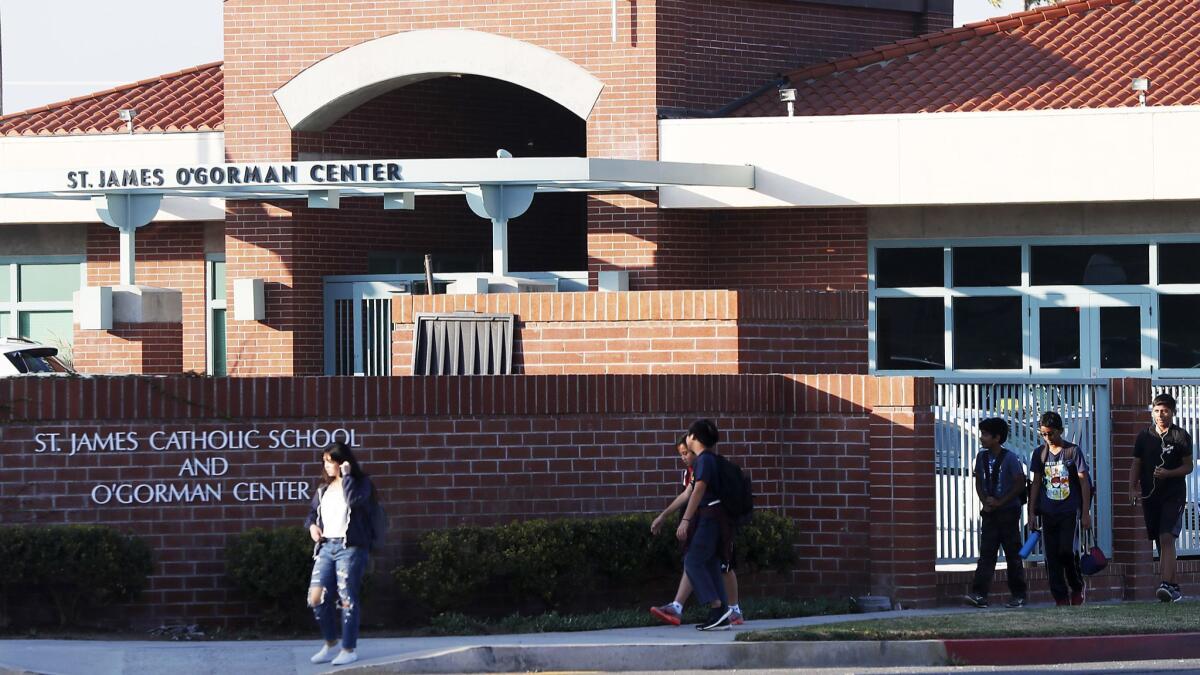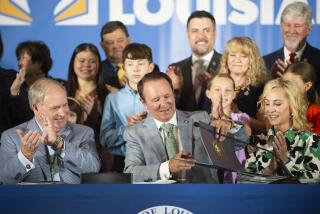Torrance Catholic school case leads to rift on 9th Circuit

Nine conservative federal appeals court judges, including four Trump appointees, insisted Tuesday that teachers at religious schools should not be allowed to sue their employers for alleged labor violations.
Nine of 11 Republican appointees on the U.S. 9th Circuit Court of Appeals expressed their dissatisfaction in a dissent from a decision to refuse to reconsider a case in which a teacher was permitted to sue a Catholic school in Torrance for firing her.
The dissent, written by a Trump appointee, complained the court had trampled on religious liberties guaranteed in the Constitution and upheld by the U.S. Supreme Court.
“Catholicism contains a rich history replete with evidence that its teachers play an essential role in its religious mission,” wrote 9th Circuit Judge Ryan D. Nelson, a Trump appointee who joined the court in October.
The number of the dissenters was unusually large, a reflection of the growing number of Republican appointees on the 9th Circuit and perhaps the church issue at stake.
For decades, the 9th Circuit has been one of the most liberal federal appeals courts in the country. That is changing as 9th Circuit judges retire or die, leaving President Trump to fill the vacancies.
He now has six appointees on the 9th Circuit and is expected to win confirmation of a seventh this summer. Among the active judges, there are now 16 Democratic appointees to the 11 Republicans.
The dissent stemmed from a 9th Circuit panel’s 2-1 decision in December to overturn a district judge and allow Kristin Biel, fired from her fifth-grade teaching position at St. James Catholic School, to sue for disability discrimination.
The two in favor of allowing the suit were Obama appointees. The dissenter was appointed by former President George W. Bush.
Biel said the Torrance school let her go after she told her supervisor she had breast cancer and would need to miss work to undergo chemotherapy. Her previous evaluation had been largely favorable.
The panel reasoned that Biel was not performing a ministerial function of a church. “She described herself as a teacher and claimed no benefits available only to ministers,” the panel said.
It refused to reconsider, and the 9th Circuit’s active judges declined an en banc review by a larger panel in a behind-the-scenes vote.
Criticizing the refusal to reconsider, the nine Republican appointees said the court had narrowed the 1st Amendment’s ministerial exception and defied precedent.
“Teachers, like Biel, at mission-driven schools, like St. James, convey the Church’s message and carry out its mission,” Nelson wrote for the dissenters.
He accused the majority of the 9th Circuit of “turning a blind eye” to religious liberties protected by the U.S. Constitution.
By refusing to reconsider, “We exhibit the very hostility toward religion our Founders prohibited and the Supreme Court has repeatedly instructed us to avoid,” wrote Nelson, who is based in Idaho.
Nelson said the decision posed “grave consequences” for religious minorities whose practices and designations might not make clear that their employees have ministerial duties.
Biel taught religion at least four days per week, supervised and joined her students during twice-daily prayer and escorted them to Mass once a month, Nelson said.
“By interfering with a religious institution’s freedom to select those church personnel who promote its faith and mission, the government exceeds its delegated authority and infringes on that institution’s right to free exercise of religion,” Nelson wrote.
Trump 9th Circuit appointees Eric D. Miller, who took the bench in March, and Kenneth K. Lee, who became an active judge this month, did not sign the dissent for reasons unknown. Some new judges decide to refrain from such votes for transitional periods.
Joining the dissent were Judges Jay Bybee, Consuelo M. Callahan, Carlos Bea, Milan D. Smith Jr. and Sandra Ikuta, who were appointed by President George W. Bush, and Trump appointees Mark J. Bennett, Bridget Bade and Daniel P. Collins.
University of Richmond Law Professor Carl Tobias, who has been following the nomination process, said he expects the 9th Circuit to begin delivering more conservative decisions, particularly on ideological issues, as a result of the new appointees.
Tuesday’s decision may be appealed to the U.S. Supreme Court. A lawyer who represented the Roman Catholic Archdiocese for Los Angeles in the case declined to comment on a possible appeal. A spokeswoman for the archdiocese did not respond to a request for comment.
Twitter: @mauradolan
More to Read
Sign up for Essential California
The most important California stories and recommendations in your inbox every morning.
You may occasionally receive promotional content from the Los Angeles Times.











